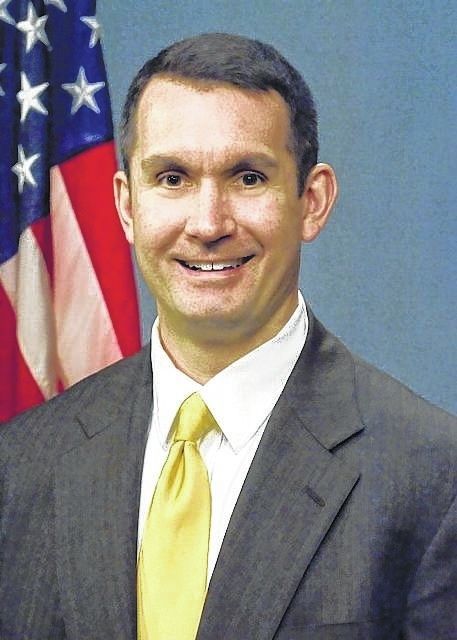Click here to subscribe today or Login.
WILKES-BARRE — Auditor General Eugene DePasquale this week again raised his concerns about the unbalanced, unfinished state budget after signing a $750 million line of credit to mitigate cash-flow problems.
DePasquale said he added his signature to the $750 million line of credit that Treasurer Joe Torsella authorized from Treasury’s Short Term Investment Pool to prevent the state’s general fund cash balance from hitting zero this month.
“The fact the state is running out of money in the second month of the fiscal year should be a wake-up call to every elected official in Pennsylvania,” DePasquale said. “My concern goes beyond the cash-flow problem that indicates the state’s unaddressed structural deficit. I am concerned that schools and county agencies across the state are once again worried about funding uncertainties.”
DePasquale said currently Penn State, Pitt, Temple and Lincoln universities are in limbo waiting for final approval of their state funding. In his recent audit of Penn State, DePasquale said it is becoming increasingly difficult for middle-class students to afford to attend state-related universities.
“An unresolved budget will make this problem worse,” he said.
“The House must do the responsible thing and come back next week to address this budget situation,” DePasquale said. “And once they are back, the House and Senate leadership and the governor should immediately lock themselves in a room and work until they figure out a way to provide Pennsylvanians with a balanced budget.”
In a joint letter to legislators last month, DePasquale and Torsella warned that the threat of a credit rating downgrade from Standard & Poor’s will ultimately result in a back-door tax increase for all Pennsylvanians because of the increased cost to pay off debt and borrow in the future.
Revisions made
to early learning
provider program
The Department of Human Services, joined by advocates and providers, this week announced revisions to Pennsylvania’s early child care and education programs.
The revisions will reduce barriers for child care providers to participate in and earn quality ratings through the Keystone Standards, Training/Professional Development, Assistance, Resources and Support program, allowing more Pennsylvania families opportunities to access high-quality services.
Keystone STARS, Pennsylvania’s quality rating and improvement system, was established to improve quality in child care and early learning programs. As of June 2017, there were 7,509 certified child care centers, group child care homes, and family child care homes throughout Pennsylvania and an estimated 168,947 children in Keystone STARS programs.
Keystone STARS promotes quality improvement among child care and other early childhood education programs through quality standards and targeted supports. Programs currently earn a STAR 1 through STAR 4 rating, with STAR 4 being the highest and most rigorous quality designation, by meeting standards for staff education and professional development, the early learning environment, family engagement practices, and business management. Keystone STARS serves children from birth through school age in every county.
Changes to the Keystone STARS program went into effect Aug 1. The improvements to the program include:
• All licensed child care providers with a full certificate of compliance will be at least a STAR 1 facility.
• Approximately 50 percent fewer quality indicators, meaning less paperwork for providers.
• Performance standards that are achievable and meaningful to programs.
• Built-in flexibility with choice for providers.
For more information on the Keystone STARS program, visit www.dhs.pa.gov.
Public input
sought on ESSA
state plan draft
State Education Secretary Pedro A. Rivera this week announced the commonwealth’s proposed Every Student Succeeds Act (ESSA) Consolidated State Plan is on the Pennsylvania Department of Education’s website for public review, and comment will be accepted.
The plan builds on an 18-month collaboration between the PDE and a diverse group of stakeholders from around the state.
“The Wolf Administration, through its Schools That Teach initiative, has been focused on ensuring that all students, regardless of their age, socioeconomic status, or ZIP code, have access to high-quality educators and schools,” Rivera said. “Pennsylvania’s ESSA Consolidated State Plan accelerates state-level priorities in these same areas, and helps the state transition from the prescriptive policies and unintended consequences of (No Child Left Behind) to a more student-centered approach.”
Rivera noted that the plan also presents new opportunities for the commonwealth to develop, recruit, and retain a talented and diverse pool of educators, bolsters college and career readiness and effective transition strategies throughout the pre-K to post-secondary continuum, and focuses on student and school equity.
Additionally, the development of the Future Ready PA Index, a new, public-facing school report card that expands the indicators used to measure performance, extends the comprehensive approach to ensuring student and school success. The Index will place additional emphasis on academic growth, evaluation of school climate through a robust chronic absenteeism measure, attention to both four-year and extended-year graduation rates, and assessments of post-secondary readiness.
Public comment will close on Sept. 2, and the PDE will submit its plan to the U.S. Department of Education on Sept. 18. Initial implementation of the plan will begin in the 2017-18 school year, with full rollout by 2018-19.
Find the ESSA Consolidated State Plan on the PDE website at www.education.pa.gov.
Residents urged
to prevent tick,
mosquito bites
Wolf administrations officials this week reminded residents they can take steps to prevent mosquito and tick bites, highlighting the increase of Lyme disease cases in Pennsylvania over the past two years.
According to the 2016 Lyme disease data, more than 2,000 more cases of Lyme disease were reported in 2016 than in 2015. The Centers for Disease Control and Prevention’s most recent data indicates that Pennsylvania leads the nation in Lyme disease cases.
The first line of defense against Lyme disease and any other tick-borne illnesses is avoidance of tick-infested habitats, such as areas dense with shrubbery or tall grass. Proper use of personal protective measures such as repellents and protective clothing — and checking for and removing attached ticks — is also an important deterrent to tick-related complications.
Another outdoor pest that residents should be aware of is the mosquito, which spreads diseases such as West Nile or the Zika virus. The CDC recently released updated testing guidelines indicating that Zika virus testing for asymptomatic pregnant women is no longer routinely recommended, but that healthcare providers should defer to the guidance of their state and local health departments.
To find out more about staying safe outdoors in Pennsylvania, visit www.health.pa.gov, www.dep.pa.gov, or www.dcnr.state.pa.us.









